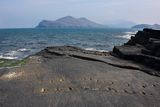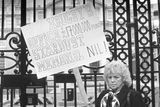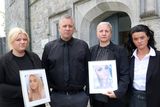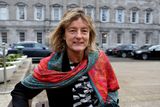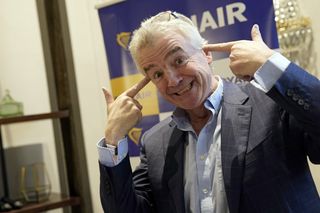Seven minutes that shook the world: Riverdance creators talk love, cancer and Michael Flatley ahead of 25th anniversary
Ahead of the 25th anniversary of Riverdance, John McColgan and Moya Doherty talk to Barry Egan about love and marriage, parting company with Michael Flatley, RTE and cancer
Moya Doherty's words are as graceful as her style. Draped in a navy Jil Sanders dress illuminated by the sunlight streaming in through the Georgian windows of the Merrion Square offices of Riverdance - the show she co-founded with her husband John McColgan - Moya talks about her recent health concerns with power and dignity.
"They are not huge in the scheme of things. I find my own story rather dull. I'm fine. I've been blessed," she says. "If I was to say anything, I would say to women, 'Go get breast-checked. Do not not go for your BreastCheck appointment', because I know there are many services broken in this country but, my God, BreastCheck is one amazing service. I was caught on time. It could have been much, much worse, and there were further complications, but actually it makes you really grateful. And I have had a lot of dear friends who have had terrible journeys. So I am really quite blessed."
"It must be very tiring, though," says John. "Yes," says Moya, "it has taken energy levels but that's fine. A lot of people are suffering."
In truth, if anything, what we suffer from most this afternoon in Dublin 4 is sustained laughter. Asked was it true that John put flowers on her desk at RTE in an attempt to woo her on her 24th birthday, Moya laughs: "Freesias, yes. That was a long time ago." What did it say about John that they were freesias? "That I liked the smell of them and they weren't too expensive," laughs John. Was John stuck for a few quid? "We hadn't a brass to our name," says Moya.
"Things were tight at that time," says John, "and one of the reasons I wanted to go to London was I was twenty-something years in RTE and I didn't want to wake up and be getting a gold watch without testing myself in some other waters. So, we went to the coffee shop in Ballsbridge. What was it called?"
Moya: "Second Row?"
John: "We had a coffee there and made the decision there and then that we would go to London. We bought a house in Sudbury Hill in Highbury. London absolutely altered our financial circumstances because we were both earning good salaries at TV-am and paying 24 pence in the pounds as opposed to 60 pence in the punt in Ireland in tax. I was getting three times at TV-am what I was earning in RTE."
Moya: "London was wonderful. It was the height of Margaret Thatcher's regime, unfortunately. It was a difficult time to be Irish in London, because you had the Harrods bomb, among other things. But we had a fantastic time working in TV-am together. We left a very depressed Ireland. The Divorce Referendum was rejected, the Abortion Referendum was rejected. So it was socially and economically, politically, a dark enough place in Ireland in the late 1970s and early 1980s.
"And London, by comparison, was blossoming, particularly in our industry, the television industry. So we both got jobs very easily in TV-am. And suddenly, we had money. I remember buying my first car for cash, £4,000. A little Renault. I loved it. I couldn't believe the fact that I could buy this car for cash."
John and Moya could afford to go to the theatre in London any night they wanted, sometimes with pals like Gabriel Byrne and his then girlfriend, the late Aine O'Connor.
"They lived in Hampstead and we lived in Islington. It wasn't too far," says Moya. "Liam Neeson was there at the time too. He was dating Helen Mirren at the time. They cut a fantastic dash around the theatres in town."
As did John and Moya when they got married on Christmas Eve, 1986.
"At that stage," says Moya, "we had been kind of living together for about five years. He and I had spoken about it. I was reluctant to. John had been married [to the late Virginia Cole, with whom he had two children, Justin and Lucy]. So he had to sort out the divorce. It suited me because I am really not interested in the big wedding thing or anything like that. Your divorce had come through and you said, 'Let's get married'. And I said, 'Oh, okay! God!'.
"It was how we would structure it. And then he rang the Finsbury Town Hall registry office. I remember I was in the kitchen. John put his hand over the phone and said to me, 'The only day they have is the 24th of December'. I said, 'God, John! The 24th?' John did a chicken sound as if I was chickening out. Then I said, 'OK! OK! Take it!'" Moya laughs. The couple came back to Ireland the following year.
Moya was born in Enniskillen hospital in 1957, and lived in Donegal before moving to Dublin when she was a young girl. Her parents Daniel and Patricia were primary school teachers. "My father got a job in Pettigo and my mother got a job outside. I just remember that we lived in a rented house and that there were five of us."
John laughs: "Genteel poverty."
Moya: "There was a ban on married women working at the time. So my mother couldn't work and my father was earning very little. It was the late 1950s, early 1960s, but that was the life for everybody. We're weren't poor. There was always food on the table. You had no expectation to get anything really. And then we moved to Dublin. That was a big change. The year Nelson's Pillar was blown, actually, 1966."
John, laughing again: "There was a rumour at the time that you did it!" Moya, laughing: "I could have had those Republican background strands alright!"
Be that as it may, Moya says she inherited from her parents "a work ethic. Education was everything to them, because education got them out of poverty."
Moya got a place in UCD to study French and English "and then at the same time I got a job as a secretary in RTE. I was 19."
How does she look back on that 19-year-old? "A young woman in a hurry, not prepared to hang around."
Neither was John. Now 74, he was born in Strabane but relocated to Wexford at the age of five before moving to Dublin when he was 12. At school in Tombrack in Wexford, the principal was an actor and a magician. "He used to do magic tricks in the class. So it was a lovely school, an idyllic country school."
When 13-year-old John went to Joseph's in Fairview, it was a shock. "It seemed to attract some teachers who were given licence to beat. I wasn't the only one. I saw boys wetting the floor with fright. I saw boys almost passing out with fright."
One day John was asked to do Latin declensions in front of the class. For every one you got wrong you got two very hard slaps on the hands with a big black leather strap.
"A big arm going back over the head and coming down on your hand," he remembers. "I didn't cry, I didn't make any noise. Once you get two slaps you can't remember your own name but he kept slapping until I got 12 slaps. My hands were swollen and I couldn't ride my bike home. But I remember walking home thinking, 'I'm a good lad. I don't deserve that. I'm not going back there again.'"
And he never did.
"The Brothers came up to the house and they pleaded… my father was quite right to be insistent that I get an education. I said to my mother, I would go to night school and I was going to work until I found my way into being an actor."
Moya: "I suppose, for both of us that was part of the attraction: that we did have an outsider piece. We didn't conform to tradition, a traditional route, and that then allows you that independence of nature which forces you to work a little harder maybe."
John's father Danny didn't speak to him for years. I ask Moya did John's complex relationship with his father affect their relationship, because he had something inside which he perhaps hadn't dealt with.
John answers: "My father was very fond of you, and the times changed and the grandchildren came along."
Moya: "I was very fond of him."
John: "He mellowed. And he was a fantastic grandfather."
Did it affect John psychologically to have that complicated relationship with his father?
"I don't know whether I am arrogant or naive, but it didn't really, no. I was very self-contained."
Is John too self-contained, Moya?
"I can't really answer that," she says. "You [addressing John] were probably a young man in a hurry. You had a fantastic mother. You chose to ignore the more autocratic father and do your own thing. There's a price that you pay for that. And as life matures - as we all matured - I can see why you and your father would be at odds, but I respected a huge amount about your father. He had tremendous integrity. He had very strong views on things. He was a really bright man."
Did he get to see John gain his international acclaim?
"I don't know if forgive is the wrong word or reconciliation, but I don't carry things around with me. I believe most of the time I'm right - and I'm happy in that ignorance. So I never had any conflicts with decisions. I never sat down and worried, 'Am I doing the right thing?'.
"I had a lot of self belief - which I think was from my mother. She used to say every night to me, 'I love you, you are the best boy in the whole world'. When the school thing happened, I said to her, 'Don't worry, I'll be fine'. She said, 'I know you will'. She knew instinctively that my personality would forge its own way forward."
And John and Moya knew instinctively even before the performance of Riverdance by Michael Flatley and Jean Butler during the interval at the 1994 Eurovision Song Contest that they had something truly special.
Moya, who was executive producer of the Eurovision that year, can remember taking the crew off to dinner in a restaurant in Naas before Christmas. She booked a mini-bus and played them the music for the first time.
"I put it on a cassette, as you did then," laughs Moya. "I said, 'This is Flatley's entrance, and this is Butler's entrance'. It had a driving rhythm to it. It had a fantastic structure to it."
John: "It built."
John says he knew Riverdance was truly special at rehearsals - "there was a frisson of something being really different. You never know until you know. But I suppose there was a moment in time that I had never seen before - or probably since.
"The audience didn't know what to expect. There were 4,000 people from Germany, France, Spain, Italy sitting there, not knowing what was going to happen. There was no anticipation from them about what it might be - but when it started there was a sort of audible gasp in the audience that this was something quite different. And by the time the Riverdance number finished, the 4,000 people jumped to their feet, without hesitation. I had never seen that before.
"From all different nationalities. They jumped and they cheered and they were making primal noises, like at a rugby match. The President, Mary Robinson, she jumped to her feet. Everybody did.
"And in that moment - I had tears in my eyes - you knew. If you are talking about focus groups or testing… there were 4,000 people from around the world who went crazy for it. So, at that moment, certainly, the ambitions and the idea of whether it would work or not were confirmed."
I ask Moya how she felt at that moment.
"I missed that moment!" she says. "Because I was calling in Bosnia Herzegovina. There was a war at the time. I was producing the show. I had responsibility for the Eurovision, right down to the very end. I was still working."
I asked John did he text Moya.
"There was no such thing," Moya answers. "But I knew. I was in a box backstage with monitors, calling in the voting. That is a critical part of it. And as executive producer - even though there were other producers and directors - you were responsible for that. So, Charlie Byrne - the great Charlie Byrne, who was head of sound in RTE - said to me: 'Moya, they are on their feet!' I said, 'Who's on their feet?' And he said, 'The audience!' 'Oh, thank God that went well. Now come in Bosnia Herzegovina'."
Moya had not realised just how well the 7 minutes and 40 seconds of Riverdance had gone and indeed how much that performance would change her life.
"I had known before, actually. I had seen it at rehearsals, I had seen it on camera. Hard-bitten camera men and techies were coming to me and saying, 'Your dancers are amazing'. So I felt good, that it was going to work."
John and Moya soon realised they could turn Riverdance into a show.
John: "There was a front-page headline in the Sunday Press, which I think was a bit hyperbolic - 'Seven Minutes that Shook the World.'"
Moya: "The biggest jump was making seven minutes into a two-hour show. There are no guarantees. But we didn't talk about it the next day. I was flattened. I couldn't even speak the next day. I was so tired.
"Ireland won with Paul Harrington and Charlie McGettigan with Rock 'n' Roll Kids, a beautiful song. Everybody was happy. The delegations were off home. RTE had delivered. And then Liam Miller [who had asked her originally to do the Eurovision ] called me again and said, 'Moya, would you develop your idea and do me a two-hour Christmas special and we'll budget it?' This was April 30. So John and I talked about it and we said, 'Actually, what we should do is make a theatrical show that we can film. So we would get the television but also the potential of a theatrical show."
Did John and Moya re-mortgage their home to do Riverdance?
"We were exposed financially," says Moya.
Does that mean if Riverdance hadn't worked out they could have lost their home?
"Yes," says Moya. "We would have been down, seriously."
With two kids - they have two sons Mark and Daniel - as well. That is a lot of self-belief, isn't it?
"Well, the yin and yang of us - I'm more caution," says Moya. "John is more gung-ho. It is a good balance in a way because we do talk things through quite well."
John: "It is in my nature to think the glass is half-full, but I was convinced that this was a once-in-a-lifetime opportunity. I thought the risk was minimised by the fact that if we couldn't sell out the Point for a week… and I thought we could… and from there on in we built the show."
Moya: "We had a deadline. A deadline is a very precious and frightening thing. Because Ireland had won the Eurovision, we were performing the Eurovision again in May 1995. I genuinely believed if we didn't mount Riverdance the Show prior to the next Eurovision, we had lost our slot."
John: "Lost momentum, anyway."
Moya: "So, then we had a time-frame and it was written and conceived and designed and produced and funded - or not funded - and promoted, and we opened on February 9, 1995."
Riverdance went on to be perhaps the most successful show in the history of Irish entertainment.
Two months before the show opened at the Point, John's mother died. "She didn't see Riverdance," says John. "I was very close to my mother but, whether this is a good or a bad thing, I compartmentalised it [her death]. Riverdance at that time was all-consuming. "
Moya; "It was a really difficult time for John."
Did his mother's death come up later on in his life emotionally?
John: "Probably, yeah. We quite regularly say, because Moya was quite close to my mother, that it was such a shame that she didn't get to see it. But she was with us the night we saw Flatley and Butler in the National Concert Hall for the Mayo 5000 performance [they danced separately]. Moya had seen these people and thought they were something special, in the way that they danced Irish dancing, and thought it had potential."
Moya laughs at the word 'potential'.
John: " There was sadness at the back of my mind during Riverdance, but you hadn't time to… I'm not sure if indulge is the right word… indulge in grief at the time. There was so much focus needed to be put on this show. It was a beast of a thing to put together, with all these international artists and the music and the choreography and so on."
How did they feel when the tickets for Riverdance at the Point flew out the door?
Moya: "We knew then that we weren't going to lose the house. We were going to be able to pay everybody. There was nobody going to lose any money - and maybe actually there was a chance of making some money - but then, the big thing was, 'Christ! We have to deliver the show! People have bought their tickets in advance and we still haven't the show!'."
John: "I felt that the idea was so strong and was so unique and had such originality and integrity that we would sell out the Point. But the next question was, would we get a couple of years out of Riverdance?" smiles John, speaking ahead of the 25th gala anniversary of the show at the 3 Arena in three weeks' time.
"Would we get a run out of it in the UK, and would we get a run out of it in America? That was probably the height of the ambition of it."
Moya: "And once it did well in the Point… it is a small community, the world community of promoters, and they came to us. Our great friend Clint Mitchell, who has managed the show for 25 years, of the William Morris Agency in LA, said to his boss [Moya puts on James Cagney-esque American accent] 'There is a show with cloggers in it, in Dublin. Can I go?' And his boss said, [Moya dons another stagey American brogue], 'Yeah, but you're going steerage! We're not paying you first class to go and see cloggers!''
John and Moya burst into laughter. "He came over, and he could see it instantly. He loved the cloggers."
John: "We sold out Hammersmith in London for weeks and weeks."
Moya: "It took a little bit of time with America. We didn't get into the States until 1996. So we played in February 1995 in the Point. We played the end of the summer of 1995 in London, then we went to New York in March 1996."
How were their lives transformed? What was it like emotionally for them?
Moya: "You just do it. You don't access it. I don't think any of us could have foreseen that Riverdance would have been as big internationally as it has been and would still be around and we would celebrating its anniversary 25 years later. That is extraordinary."
They are also working on an animated adventure film using the music of Riverdance. "It is a beautiful story aimed at children. It is set in Ireland. We are producing it ourselves and Bill [Whelan] is doing the music. It will be launched at Cannes."
Why does Riverdance work?
"It is a multi-faceted answer but I think that the hard-shoe rhythms really affect people," says John. "And also, everyone on the stage is a real person. They are not in costume. They are not in Phantom, they are not in Les Mis. They are in the show about Ireland. So, there are acting performances but they are dancing for themselves, for their art, for their craft and for their country. They feel that very much."
Michael Flatley famously parted company from Riverdance on the eve of the show in London in October 1995. What happened?
Moya: "Oh, gosh. It is a long, long time ago now. I think Michael wanted to do a different type of show, essentially. He wanted to do The Lord of the Dance, which he went on to do.
"We were really lucky with the show when it opened at the Point. As a producer, I felt we had a long way to go and it could be much, much better than it was when it first opened, even though the audience responded really well. So we started to make changes, to develop the show in a cultural way, and Michael didn't like that [direction]. So, we had to hold on to what we wanted to hold on to."
John: "I remember him saying in rehearsals one day, 'John, I could make an entrance here. I could be naked from the waist up and have baby oil. I could stop on my knees.'"
Moya; "But a brilliant talent. A fantastic talent."
John: "He was fantastic. He really was part of the spark."
I ask Moya did she fire Michael.
John: "I think Moya can contradict me, 'firing' is a very emotive word. He had a contract renewal and he had a list of demands, which we could not meet at the time, without giving up creative control."
Moya: "I have a slightly different view. I think that because he hadn't put his name on the contract he wasn't insured to dance. We needed to have a signed contract in order that he be insured. So I think I carried the message to his manager at the time, to say, 'Unless Michael signs his contract, he can't dance'. So, it was really that. And he didn't sign."
John: "I think maybe Michael thought that we couldn't go on without him, and that there was nobody who could do what he did."
Elsewhere, there seems to be a high-stakes game of poker being played at RTE at the moment. Moya, who is the chair of the RTE board, says: "I just do the best I can. I care deeply about public service media and I care about the Irish voice and I care about the protection of it and I am really, really pleased that the Government has set up a commission. I look forward to the work of that commission because I think it is important.
"Look, we all know how tricky media is for everybody right now. It is a really difficult time and I think we must all work together to make sure that we don't hand the voice of this country to dark forces or people who don't care."
What does she mean by dark forces?
"Well, the way perhaps US elections could have been rigged or all sorts of things that are going on out there. We need to ensure that what we get has a truth about it and an authenticity. So those things are really important."
Riverdance, the 25th anniversary show, previews at the 3 Arena on Feb 6 and then runs on Feb 7 and 8 (matinee and evening) with a gala show on Feb 9. See aikenpromotions.com
Riverdance for beginners
Riverdance
* The show has been seen live by over 27.5 million people in 546 venues worldwide
* The company has sold 10 million Riverdance videos and DVDs
* The Guinness World Record for the 'Longest Riverdance Line' featured 1,693 participants
* Over the years, there have been 22,000 dance shoes worn by the company
* There have been 17,500 costumes worn
* More importantly for romantics, there have been 62 marriages between company members
* And more importantly for humanity at large, there have been 104 Riverdance babies born - and more are on the way!
* More prosaically, there have been 6,000,000 lbs of dry ice used onstage
* And 50,000 rolls of self-grip tape used by company physiotherapists
* And after the 25 years of curtain falls there have been 1,000,000 lbs of ice in post-show ice buckets used by the dancers to aid muscle recovery. Now that's got to hurt...
Join the Irish Independent WhatsApp channel
Stay up to date with all the latest news


